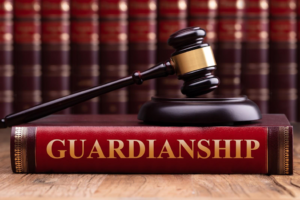
How To Nominate Someone As Legal Guardian Of My Child In An Estate Plan
Planning for legal guardianship of children is a key factor in estate planning. Most parents want the best for their children, regardless of the circumstances. While it may be heartbreaking to consider, it is important to take into account what would be best for minor children if one or both of their parents should pass away. Generally, most families elect to appoint a legal guardian for their children should the parent be unable to care for them due to injury or death.
However, appointing a legal guardian may not be straightforward, depending on the family’s state of residence. A skilled Arizona estate planning lawyer from Harrison Law, PLLC can help clarify the process of appointing a legal guardian. Consider contacting the office by calling (480) 320-2310.
What Is Guardianship?
According to The Arizona Department of Child Safety, guardianship is a process that transfers the duty and ability to make important decisions for a minor or other select individual to someone who is not their parent. This process will allow the guardian to make medical, financial, and other decisions on behalf of someone who may not be able to make those decisions for themself.
However, this process does not terminate parental rights or revoke their authority over the child’s life. While it does allow for decisions to be made on the child’s behalf, it is different from adoption as the legal guardian does not hold equal authority to a parent nor terminate the parental relationship.
Guardianship Requirements
Legal guardians are generally close family members such as aunts, uncles, or grandparents. Technically, any person who is above the age of 18 can apply for legal guardianship. Still, in the case of choosing a guardian for an estate plan, this is usually a family member or close friend of the parents.
Most would recommend that the legal guardian be a responsible adult with an established relationship with the child. In addition to this, it is generally good for this person to be financially responsible, in good health, and willing to take care of a child. Having this person step in and take care of minors is a key facet of incapacity planning.
Steps for Nominating a Legal Guardian
When it comes to the process of nominating a legal guardian for a child in an estate plan, there are several important steps to consider. Many choose to make these decisions while writing a will. For more detailed information on the process, consider speaking with an experienced Arizona estate planning lawyer from Harrison Law, PLLC.
Identify Potential Guardians
To begin with, it may be beneficial to create a list of potential guardians to nominate. By evaluating all available options, one can ensure the best possible care for the minor. In general, it is best to consider factors such as age, financial security, lifestyle, health, relationship with the child, and willingness. Most people tend to choose extended family members or close friends.
Discuss Guardianship with Potential Guardians
The next step is to discuss these wishes with the potential legal guardians, informing them of the responsibilities that guardianship entails. Some people would be a good fit for a guardian but are unwilling to commit to that significant lifestyle change. Be sure that any potential guardians understand the responsibilities, as well as other important factors such as the parent’s wishes for their child, parenting style, and beliefs.
Consider Financial Situations
In addition to this, considering the financial situation of potential guardians can play a large role in the deciding process. Being a parent or guardian is not only a relational task but also a significant financial commitment. A legal guardian will have to not only provide food, shelter, and clothing, but also things like education, transportation, and other long-term needs. Ensuring the financial responsibility and stability of a prospective guardian can help protect the child’s future.
Choose a Backup Guardian
While creating an estate plan and considering legal guardianship, one may also wish to nominate a backup guardian or several to ensure proper care for a minor. There is a chance that circumstances change for the first choice of a legal guardian, and they are unable to accept. In this case, having a backup guardian can ensure that the parent’s wishes for the child are adhered to.
Document Wishes Clearly
Once the decision is made on who should be the legal guardian of the minor or minors if their parents are incapacitated, then all that remains is to document these wishes clearly. This is generally done with a last will, which will come into effect upon the death of the testator. In addition, some certain trusts may also be able to nominate a legal guardian. Having these wishes in legally binding writing will ensure that the child ends up with the proper legal guardian.
Revisit Decision Regularly
Lastly, revisiting this decision regularly to ensure circumstances have not changed may also be beneficial. Life is difficult to predict, and an out-of-date last will may name a legal guardian who is no longer prepared, willing, or financially able to take on that role. Updating and revising this document regularly can help prevent mishaps such as that.
Probate and Juvenile Court Guardianships
However, it may be relevant to note the differences between probate guardianship and juvenile court guardianship, sometimes referred to as Title 14 Guardianship. Probate guardianship is established by a will and may operate under different rules and standards than juvenile court guardianship, which is established when living parents may not be able to care for a child or are not maintaining a safe and healthy environment. Different laws and standards may apply to the different variations of legal guardianships.
Frequently Asked Questions
Listed below are some of the frequently asked questions regarding appointing legal guardians.
What Happens If I Do Not Nominate a Legal Guardian?
If one does not nominate a legal guardian in a will, or one dies intestate, the probate courts will likely appoint a legal guardian in the best interests of the child.
Consider Contacting an Arizona Estate Planning Lawyer
While managing wills, nominating legal guardians, and planning for the future may be stressful and intimidating, for those with minor children, it can mean a safe and happy future. Establishing these decisions clearly and effectively can help protect children from harm, uncertainty, and unnecessary heartbreak by providing a clear plan and trustworthy people to help them along the way.
For more specific information on how to nominate legal guardians in an estate plan, consider speaking with an experienced and compassionate Arizona estate planning lawyer from Harrison Law, PLLC by calling (480) 320-2310.
© 2024 Matthew W. Harrison and Harrison Law, PLLC All Rights Reserved
This website and article have been prepared by Harrison Law, PLLC for informational purposes only and does not, and is not intended to, constitute legal or financial advice. The information is not provided in the course of an attorney-client relationship and is not intended to substitute for legal advice from an attorney licensed in your jurisdiction.






